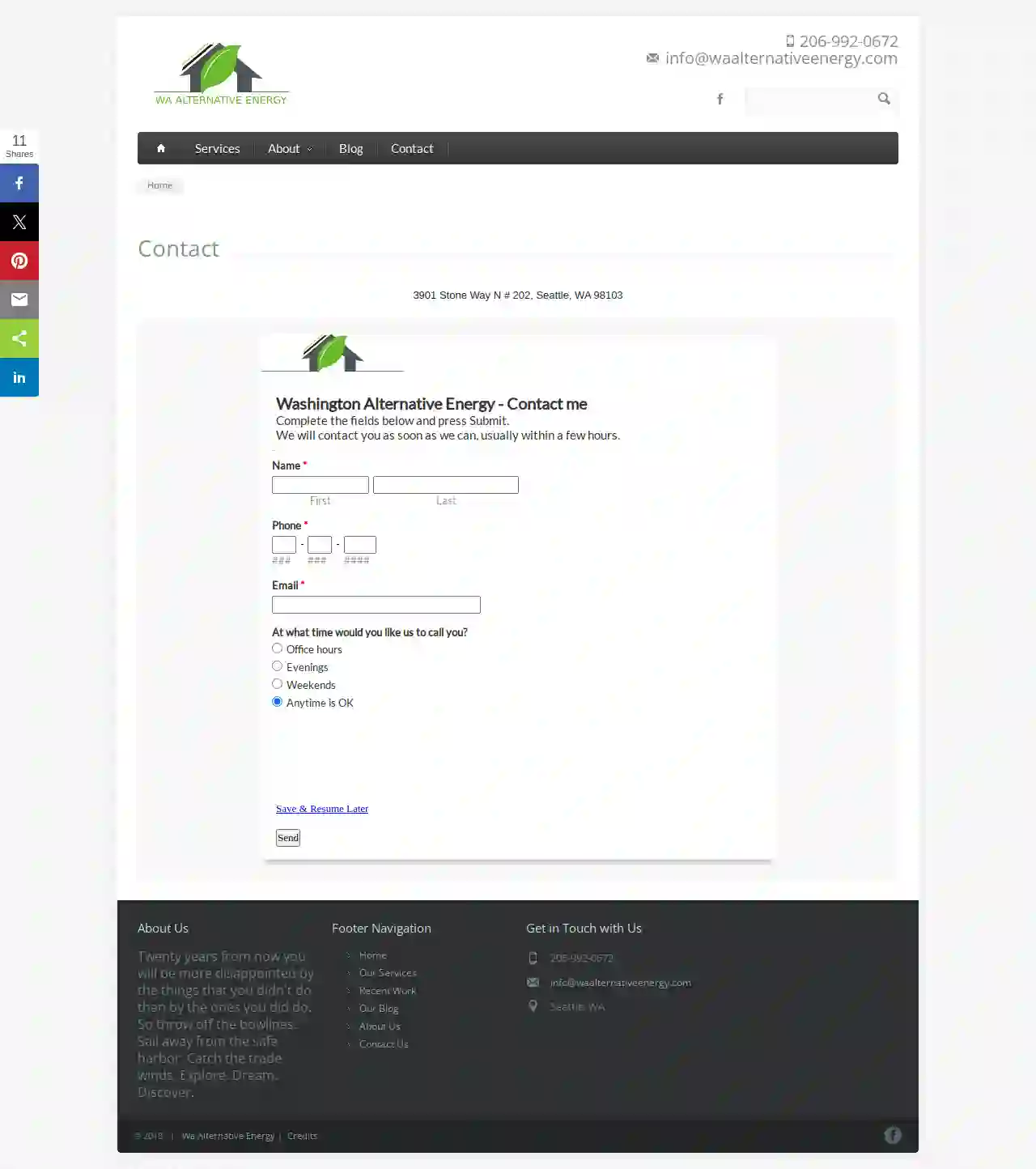Solar Installers Lynnwood
Find Solar Installation Company in Lynnwood
Receive up to 3 Solar Energy Company quotes for your project today! Compare profiles, reviews, accreditations, portfolio, etc... and choose the best service.

Puget Sound Solar LLC
4.858 reviews805 Rainier Ave. S., Seattle, Washington, 98144, USPuget Sound Solar LLC is a leading provider of solar energy solutions in Seattle, Washington. Since 2001, they have been dedicated to providing top-quality services to both residential and commercial clients. Their mission is to offer the best warranties in the industry, including a 25-year workmanship guarantee, a 10-year performance guarantee, and a 10-year equipment labor warranty. They use advanced lidar imaging technology to provide accurate preliminary quotes and ensure transparency in their design-oriented solutions.
- Services
- Why Us?
- Accreditations
- Our Team
- Testimonials
- Gallery
Get Quote
Northwest Electric and Solar
4.9161 reviews18001 73rd Ave NE, Kenmore, 98028, USNorthwest Electric and Solar is a leading solar contractor in Washington State, specializing in designing and installing state-of-the-art solar panel systems. Founded in 2011 by Master Electrician Derek White, the company is driven by setting the standard for excellence and providing the highest quality solar solutions tailored to unique needs. The company offers a suite of renewable energy and electrical services, including solar, EV charging, battery backup, SPAN, Tesla Solar Roof, and electrical services. Northwest Electric and Solar is an NABCEP-accredited company, ensuring the highest level of customer satisfaction through continuous training and expertise.
- Services
- Why Us?
- Accreditations
- Our Team
- Gallery
Get Quote
Smart Solar Energy Seattle Washington
53 reviews123 Solar Way, Portland, 97201, USSmart Solar Energy is a green energy company that specializes in providing residential and commercial solar energy services. They offer solar panel installation, solar incentives, and solar audits. Their services aim to help homeowners and businesses become more environmentally friendly while saving money on utility bills and increasing property values. They provide financial incentives for switching to solar energy and offer various guarantees including labor warranty, solar panel warranty, real-time monitoring, production guarantee, solar inverter warranty, and project support.
- Services
- Why Us?
- Accreditations
- Our Team
- Testimonials
- Gallery
Get Quote
BRJ Solutions
7001 Seaview Ave NW Ste 160-760, Seattle, 98117, USBRJ Solutions, LLC is a veteran-owned business that specializes in providing energy independence solutions for marine, automotive, off-grid, and emergency back-up power. They offer a range of products including lithium batteries, solar panels, controllers, and more. Their team works closely with customers to design energy systems that meet their specific needs.
- Services
- Why Us?
- Accreditations
- Gallery
Get Quote
NW Wind & Solar
4.211 reviewsConcord, ON, Canada, 20 Floral Parkway, Toronto, L4K 4R1, USOZZ Electric specializes in large-scale projects, high profile design-build work, retrofit applications, and clean energy solutions. They provide full service in the residential, industrial, commercial, and institutional (ICI) spaces. Their work is based on a philosophy of service and technical excellence, building positive long-term customer relationships and enduring industry partnerships.
- Services
- Why Us?
- Accreditations
- Our Team
- Testimonials
- Gallery
Get Quote
Sphere Solar Energy
4.873 reviewsSeattle, WA, 9520 Roosevelt Way NE, 98115, USOur mission is to make clean energy systems more accessible throughout the Northwest and in developing communities abroad so that a greater number of individuals can power their homes and their lives in a way that does not harm the environment and future generations.
- Services
- Why Us?
- Accreditations
- Our Team
- Testimonials
- Gallery
Get Quote
SolTerra
4.790 reviews2909 1st Ave S, Seattle, 98134, USSOLTERRA SOLAR SMART, AFFORDABLE AND GOOD FOR THE SOUL. With thousands of installations in the Pacific Northwest, going Solar has never been easier! Help the environment, improve your home’s value and save money.
- Services
- Why Us?
- Accreditations
- Our Team
- Testimonials
- Gallery
Get Quote
A&R Solar
4.980 reviews9700 Martin Luther King Jr Way S, Seattle, 98118, USA&R Solar is a leading provider of solar and battery backup solutions for residential and commercial properties. With a focus on sustainability and customer satisfaction, they offer a range of services including solar installation, battery backup systems, and solar training. Their team of experts is dedicated to providing top-notch service and ensuring that clients achieve their sustainability goals.
- Services
- Why Us?
- Accreditations
- Our Team
- Testimonials
- Gallery
Get Quote
Wa Alternative Energy
3901 Stone Way N # 202, Seattle, 98103, USSolar Energy Systems for Homes & Businesses. We install solar energy systems in homes and businesses. All rebates go directly to the homeowner. Will you join us and be part of the environmental recovery? Our solar energy system will increase the value of your home. Our solar energy system pays for itself. Imagine having no electricity bills for the rest of your life. A long hot shower will feel more welcoming than ever!
- Services
- Why Us?
- Accreditations
- Our Team
- Testimonials
- Gallery
Get Quote
West Seattle Electric and Solar
4.431 reviewsWest Seattle, Seattle, 6921 34th Ave SW, 98126, USWest Seattle Electric and Solar is a family-run business dedicated to providing high-quality electrical work and renewable energy solutions. Founded by Keith Hughes, a veteran and former IT infrastructure engineer, the company aims to deliver premium work, manage schedules efficiently, and ensure 100% customer satisfaction. With a team of 11, they offer services including electrical repairs, installations, and solar energy solutions.
- Services
- Why Us?
- Accreditations
- Our Team
- Testimonials
- Gallery
Get Quote
Over 4,210+ Solar Installers in our network
Our solar installers operate in Lynnwood and surroundings!
SolarCompaniesHub has curated and vetted Top Solar Installers in and around Lynnwood. Find the most reliable contractor today.
Frequently Asked Questions About Solar Installers
- Contact SolarCompaniesHub: We make it simple to connect with reputable Solar Installers in your area.
- Get Free Quotes: Request free quotes from multiple installers to compare prices, systems, and warranties.
- Schedule a Site Assessment: A qualified installer will visit your property to assess your roof, energy needs, and discuss your goals.
- Review Your Proposal and Contract: Carefully review the proposed system, financing options, and warranties before signing a contract.
- Installation and Activation: Once the contract is signed, the installer will obtain necessary permits, schedule the installation, and activate your solar system.
- Cash Purchase: The most straightforward option, providing the greatest long-term savings but requiring a larger upfront investment.
- Solar Loans: Loans specifically designed for solar installations, often with favorable terms and interest rates.
- Solar Leases: A third-party company owns the system and leases it to you, allowing you to go solar with little or no upfront cost, but you won't own the system or receive tax benefits.
- Power Purchase Agreements (PPAs): Similar to leases, but you pay for the electricity generated by the system, not the system itself.
- Home Equity Loans or Lines of Credit: Borrow against the equity in your home.
- Draw electricity from the grid when your solar panels aren't producing enough power (e.g., at night)
- Sell excess solar electricity back to the grid through net metering.
How do I get started with solar panel installation?
How can I finance my solar panel installation?
What is the difference between grid-tied and off-grid solar systems?
What happens if my roof needs to be replaced after I install solar panels?
How do I get started with solar panel installation?
- Contact SolarCompaniesHub: We make it simple to connect with reputable Solar Installers in your area.
- Get Free Quotes: Request free quotes from multiple installers to compare prices, systems, and warranties.
- Schedule a Site Assessment: A qualified installer will visit your property to assess your roof, energy needs, and discuss your goals.
- Review Your Proposal and Contract: Carefully review the proposed system, financing options, and warranties before signing a contract.
- Installation and Activation: Once the contract is signed, the installer will obtain necessary permits, schedule the installation, and activate your solar system.
How can I finance my solar panel installation?
- Cash Purchase: The most straightforward option, providing the greatest long-term savings but requiring a larger upfront investment.
- Solar Loans: Loans specifically designed for solar installations, often with favorable terms and interest rates.
- Solar Leases: A third-party company owns the system and leases it to you, allowing you to go solar with little or no upfront cost, but you won't own the system or receive tax benefits.
- Power Purchase Agreements (PPAs): Similar to leases, but you pay for the electricity generated by the system, not the system itself.
- Home Equity Loans or Lines of Credit: Borrow against the equity in your home.
What is the difference between grid-tied and off-grid solar systems?
- Draw electricity from the grid when your solar panels aren't producing enough power (e.g., at night)
- Sell excess solar electricity back to the grid through net metering.